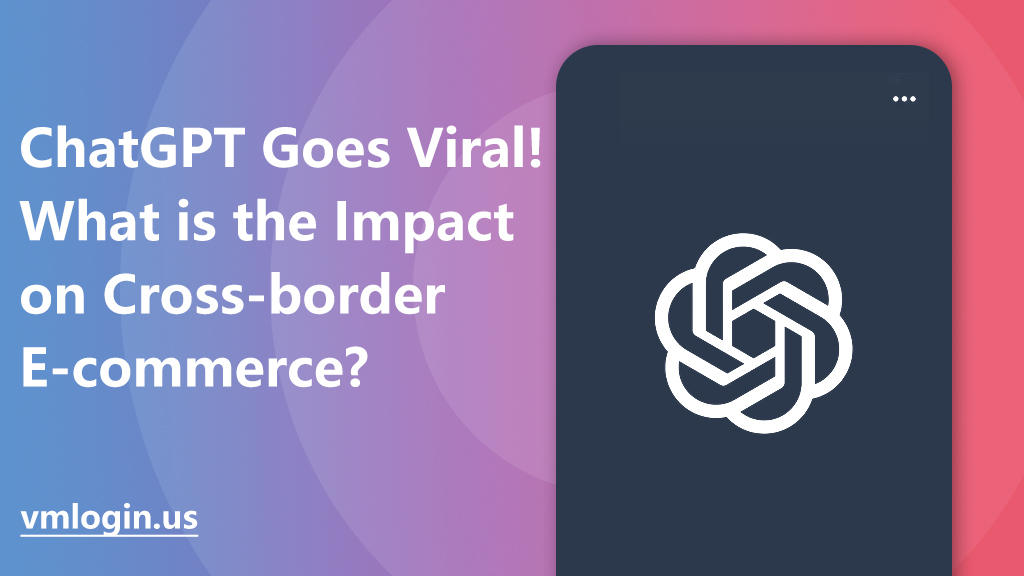ChatGPT is like a tornado that rapidly throughout the whole network, triggering attention from many parties and attracting a large number of users in just a few months. There is no lack of a large number of users in the cross-border e-commerce circle. Let’s analyze what impact the use of ChatGPT has on cross-border e-commerce.
What is ChatGPT?
There are many who have heard of it but don’t know what it is, and there are many who haven’t even heard of the name. Now, let’s answer what it is:
ChatGPT is an AI language simulation that can be used to answer questions, complete tasks, or conduct conversations. It can also be used to aid in healthcare, education, finance, and other industries to improve productivity and accuracy.
Simply put, chatGPT is an intelligent robot or AI assistant, that can chat like a human, translate automatically, compose text, serve as customer service, search for information, and even write code. Previously, when we wanted to get information or materials, we had to go to various search engines, such as Google, Bing, Yahoo! Search, Infospace, and so on. But with this intelligent tool, we can directly conduct Q&A on ChatGPT, which gives more comprehensive and even scientific answers. It can help us obtain information and solve problems more conveniently and quickly, making our life more convenient and efficient.
What can ChatGPT Help Cross-border E-commerce Sellers Do?
1. Intelligent customer service.
ChatGPT can chat like a human and understand the meaning of human language to the best of its ability, and then give appropriate answers and solutions accordingly. Most importantly, ChatGPT is available 24 hours a day, giving a punctual and accurate reply whenever a buyer asks about a product, which is more likely to win the buyer’s goodwill.
2. Write the title, keywords, and product description.
Sellers can use ChatGPT to collect keywords of products, quickly generate product titles and product descriptions by keywords, and then the seller can fine-tune according to their specific needs.
3. Automatic translation.
Cross-border e-commerce sellers face global customers, so the language they encounter is very different. With ChatGPT, you can automatically translate different languages with high accuracy, so you don’t have to worry about the language.
4. Marketing planning.
If the seller needs to plan the marketing of a certain product, make advertising, or write promotional articles. With the power of ChatGPT, just give the product name, the word count requirements, and other details and requirements, and you can get complete, creative full of advertising words and promotional articles.
5. Brainstorming tools.
Business meetings need to output ideas, but sometimes inspiration runs out. Use ChatGPT to help you come up with an idea, and others to extend the discussion, which may create an extraordinary idea.
6. Process images and videos.
ChatGPT has amazing graphics capabilities that allow for simple retouching and the ability to generate images and videos based on keywords. Just enter a specific description of the product, including keywords such as size, color, elements, and other keywords, and you will get an image that can help the seller design different product images.
7. Provide email templates.
Cross-border e-commerce involves writing emails, and you can get templates for different situations through ChatGPT. For example, invitation email, follow-up process email, bargain email with all parties, product abandonment email, and festival marketing email, just input the corresponding instructions and keywords, and you can get a professional email description, which saves time and effort for sellers.
Challenges that Accompany ChatGPT:
There are many exciting features of ChatGPT, but it also comes with some challenges for cross-border e-commerce:
1. Insufficient professionalism. While we can make the most of ChatGPT, the development of ChatGPT is not mature enough at present, and some of the information provided will be biased and not professional enough.
2. Serious generalization of copywriting. The copywriting ability of Chatgpt is indeed commendable, but if ChatGPT is used by a large number of sellers to write product copy, there will be many similar or even identical keywords, titles, product descriptions, etc., which will result in serious homogeneity of product information, and the competitiveness of sellers will also be reduced.
3. Data leakage risk. ChatGPT relies on massive database information, including a large amount of information entered by Internet users. Therefore, when sellers enter some information such as personal data or business secrets, ChatGPT may include it in its own corpus and incur the risk of disclosure.
4. Impact on team structure and management. ChatGPT is so smart that it can replace some jobs in cross-border e-commerce, which means a lot of layoffs and businesses need to change the original team management.
Conclusion
There is no doubt that ChatGPT is a double-edged sword, and its use has pros and cons. We should make good use of ChatGPTand try to avoid the pitfall that may occur.
Besides, if cross-border e-commerce sellers want to achieve their goal, in addition to using ChatGPT, it is indispensable to pair with an anti-detect tool such as VMLogin Antidetect Browser, which supports account registration, store operation, affiliate marketing, advertising verification, and so on major online platforms. It can open multiple browsers at the same time and effectively prevent account association. This will make sure perfectly safe.


